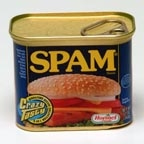TTAB Dismisses Hormel's Petition to Cancel SPAM ARREST Registration
On Nov. 21, the Trademark Trial and Appeal Board dismissed Hormel Foods Corp.’s petition to cancel the trademark registration owned by Seattle-based Spam Arrest, LLC, for SPAM ARREST, with the word “spam” disclaimed, for “computer software, namely software designed to eliminate unsolicited commercial electronic mail.”
Hormel had argued Spam Arrest’s mark was not entitled to registration based on a likelihood of confusion with and dilution of Hormel’s family of famous SPAM trademarks. Spam Arrest responded that “spam” is a generic term, which in connection with the word “arrest” is not likely to cause confusion or dilute Hormel’s marks.
(For more background, see STL’s report on the Feb. 23 hearing, which I was fortunate enough to attend.)

TTAB Judges David Sams, Ellen Seeherman, and Gerard Rogers unanimously sided with Spam Arrest:
 “The word ‘spam’ is a recognized generic term for unsolicited commercial email. There are various stories about how this term came to be adopted, including that it was a term used on computer game-playing sites to describe different types of abusive behavior, and that it is an acronym for ‘sending public announcement messages.’ However, the widely-reported origin, which appears in Merriam-Webster’s Collegiate Dictionary, 11th ed. © 2003, is that it is derived from ‘a skit on the British television series Monty Python’s Flying Circus in which chanting of the word Spam overrides the other dialogue.’ Whatever its origin, ‘spam’ is well recognized today as the generic term for such email.”
“The word ‘spam’ is a recognized generic term for unsolicited commercial email. There are various stories about how this term came to be adopted, including that it was a term used on computer game-playing sites to describe different types of abusive behavior, and that it is an acronym for ‘sending public announcement messages.’ However, the widely-reported origin, which appears in Merriam-Webster’s Collegiate Dictionary, 11th ed. © 2003, is that it is derived from ‘a skit on the British television series Monty Python’s Flying Circus in which chanting of the word Spam overrides the other dialogue.’ Whatever its origin, ‘spam’ is well recognized today as the generic term for such email.”
This finding permeated the Board’s opinion. With respect to Hormel’s likelihood of confusion claim, for example, the Board found even though the parties’ marks contained the identical term, “spam,” Spam Arrest’s mark left a different overall commercial impression:
“Although petitioner’s mark SPAM was derived from ‘spiced ham,’ it must be considered an invented word rather than a suggestive term, and therefore it has no meaning other than that of a trademark for petitioner’s goods. On the other hand, because ‘spam’ is a generic term for unsolicited commercial email, and applicant’s goods are identified as ‘computer software, namely, software designed to eliminate unsolicited commercial electronic mail,’ as it is used in respondent’s mark SPAM has the connotation of the generic term, referring to unsolicited email, and the entire mark has the connotation of software that stops or filters spam/unsolicited commercial email. Because of this difference in connotation of ‘spam’ in the respective marks, the marks as a whole are different in connotation and commercial impression.”
The Board also found that while “SPAM” is famous for canned meats, Hormel failed to establish that its mark’s fame extended to anti-spam software:
“Thus, although the fame of petitioner’s mark certainly favors petitioner herein, petitioner has not shown how that fame has carried over to computer software designed to eliminate unsolicited commercial electronic mail, or that consumers would associate such software with the source of petitioner’s SPAM and SPAM-derivative products and services.”
The Board concluded: “After considering all of the du Pont factors on which we have evidence or argument, we find that petitioner has failed to prove that respondent’s mark SPAM ARREST for ‘computer software, namely software designed to eliminate unsolicited commercial electronic mail’ is likely to cause confusion with petitioner’s mark SPAM and its SPAM-derivative marks for its various goods.”
With regard to dilution, Hormel took the position that the use of “spam” is acceptable when it is used as an ordinary, generic term, but that it is not acceptable when SPAM is used as part of a trademark. The Board rejected that argument as being too fine a point:
“Although we understand the distinction that petitioner is making, we do not believe that this is a significant difference, or one that is drawn by the statute or the case law. If a term is generic, others should have the right to use it, even as a disclaimed term in a trademark, to describe the goods or services with which the mark is used. And as we stated in our discussion of likelihood of confusion, respondent is using the term ‘spam’ in the mark SPAM ARREST in its generic sense, and that is the meaning that would be perceived by consumers.
“This is not to suggest, however, that simply because a mark has a generic meaning in other contexts it can never be considered distinctive in terms of proving dilution. We are saying only that, when a trademark has an alternative generic meaning, and it is used in a second mark to project that generic meaning, there can be no dilution of the original mark under the statute because that mark is not distinctive with respect to the goods which the generic term describes.”
Consistent with this finding, the Board found that Hormel had failed to prove its mark is distinctive when consumers encounter the mark in the context of unsolicited commercial email or products or services that address that problem. The Board also found that Hormel had failed to prove dilution by blurring or dilution by tarnishment.
The Board designated its 63-page decision as not having precedential value.
The case cite is Hormel Foods Corp. v. Spam Arrest, LLC, Cancellation No. 92042134 (TTAB 2007).

Reader Comments (1)